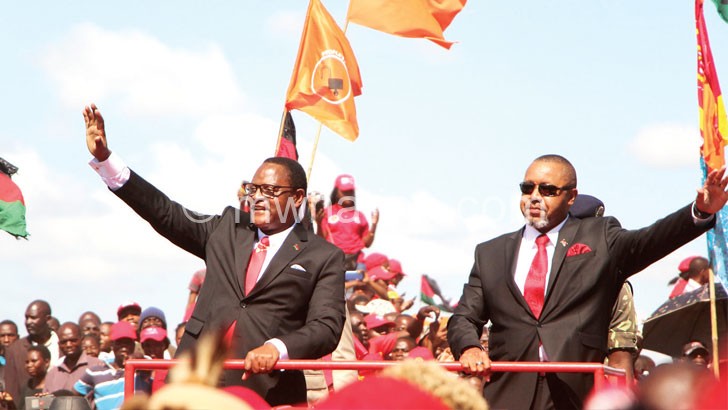APM trails Chakwera
Seven days to the court-ordered fresh presidential election on June 23, a 2020 Pre-election and Governance Survey has predicted an outright victory for Tonse Alliance candidate Lazarus Chakwera and his running mate Saulos Chilima.
The survey—conducted by the Zomba-based Institute of (Ipor) between April 25 and June 3—gives Chakwera an 18-point lead over incumbent Peter Mutharika, with 51 percent of likely voters picking the Tonse Alliance ticket. Public Opinion and Research
Chakwera’s double digit advantage leaves Mutharika and running mate Atupele Muluzi of the DPP-UDF marriage with 33 percentsupport from likely voters.
Of the remaining 16 percent, 10 percent were undecided; four percent refused to say who they would choose while two percent said they will not vote, according to the poll. That leaves a 14 percent pool of likely voters that could break for either ticket
But if the numbers hold up to June 23, the reticent voter numbers would have little bearing on the final outcome of who clinches the presidency, according to Ipor director of research and operations Boniface Dulani.

In fact, the survey projects that the Chakwera-Chilima ticket’s share of votes could rise up to 58 percent against 38 percent for the Mutharika-Muluzi pair based on how the researchers believe the numbers of taciturn voters could break.
“Either way, we think the results most likely favour the Tonse Alliance candidate, especially when using the 50-percent-plus-one majority threshold,” explained Dulani in an interview after the presentation.
The survey also finds that Tonse Alliance has overwhelming advantage across all six age groups classified in the survey and dominates in two of three geographic regions—north and Centre where they are preferred by at least 75 percent of likely voters on average.
The DPP-UDF pair controls 65 percent of the likely voters in the South, an underwhelming performance in what should be the ruling party’s stronghold.
The survey results show that the DPP-UDF team’s perception that it has failed to tame corruption, food insecurity, political violence and economic pain could be its undoing.
But DPP spokesperson Nicholas Dausi laughed off the survey’s findings, saying some people were out to create “a fake psychological warfare”.
In an interview yesterday, he said: “Whoever has heard or read about the survey is saying it is laughable… Let me assure them that the DPP and UDF alliance has all the numbers to win with a landslide. We will meet on the ground and those people will be put to shame. The question of losing does not arise.”
However, MCP publicity secretary Maurice Munthali representation of what was currently on the ground because “the wind is for change”. said the survey was a true
On his part, Ernest Thindwa, a political scientist at Chancellor College—a constituent college of the University of Malawi, said it was not surprising that DPP appears to be faring badly in every aspect because it has not done well in key issues that affect Malawians in their everyday lives.
“So, it is not surprising that majority of Malawians would want a change than the status quo because they are of the view the country is going the wrong direction,” he said.
T h e 1 0 – d a y survey-sampled 1 346 respondents and has a margin of error of plus or minus three percent at 95 percent confidence interval, meaning the percentages could either
be higher or less by three percent. Ipor said the survey had four objectives, namely: gauging public knowledge and knowledge about the Covid-19 pandemic, assessing the public mood ahead of the fresh election, understanding voters’ perspectives on the state of preparedness among different stakeholders and assessing how voters intend to vote in the forthcoming election.
Dulani said in their previous surveys, they found the elections to be too close to the point it was always hard for them to project a clear winner.
He said: “But this time around, we find the difference to be so large that the more likelihood, if these numbers were to hold, would be that Chakwera would win.
“But let me also add this is a survey. The real vote is on election day, so, if this is what Malawians are saying, whether they will go out and vote, we might see whether we will be vindicated or not. is what Malawians are saying,
“But we have always been vindicated in our previous surveys, so we are confident of our numbers, especially given the rigor that goes behind the sampling in these studies.”
In August 2018—with less than a year to the May 21 2019 Tripartite Elections— an Ipor survey rated DPP and its candidate as more popular followed by Chakwera and Malawi Congress Party (MCP) with Chilima’s then month-old UTM Party in third position. The top three in the nullified presidential election followed the same pattern.
The survey also gauged the public perceptions about the direction of the country and 85 percent of Malawians feel the country is going in the wrong direction against 14 percent who feel it is heading in the right direction.
Further, the respondents were asked to indicate their assessment of government performance in resolving what they consider to be the most important problems facing the country of which 75 percent of Malawians have negative view against 22 percent who have a positive assessment.
The survey also assessed the suitability of the candidates and their running mates in their own rights.
On this score, Chakwera topped the list in terms of quality to govern and trustworthiness besides development orientations, peace-loving and caring for the people.
He is trailed by Chilima on second position with Mutharika a distant third and Muluzi on fourth position.
Ipor conducted the survey with funding from The Open Society Initiative of Southern Africa (Osisa).
The pollster is a research organisation established in 2013 and provides social science research, advisory and consulting services to clients who include local and international universities, local non-governmental organisations and international research firms.n






4 Comments